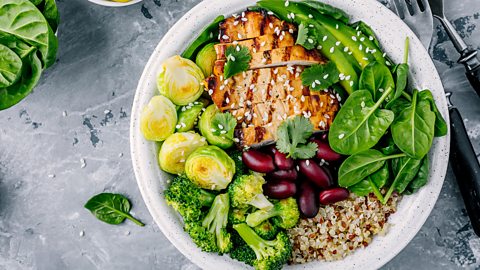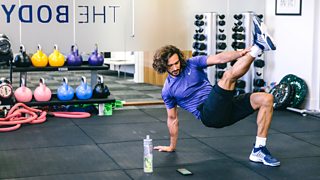How to fuel your day like a Premier League footballer
Who doesn't want more energy, particularly when faced with a gruelling schedule? In the Don’t Tell Me the Score podcast, Simon Mundie talks to world-leading sports nutritionist James Collins who has shaped the eating habits of Premier League footballers so they are on peak form when it counts.
After working with Arsenal FC, England Football and Team GB, James has distilled his elite sports success into simple food principles that any of us can follow to feel at our best.
James Collins interview

James talks about how increase your energy when you need it. Listen to the interview
Where you’re going wrong
Just as a car needs fuel to create energy for movement, so does your body, says James. Which fuel you use depends on what you’re doing.
Many of us will grab a piece of toast as we run out the door in the morning, gobble down a sandwich at lunch, and then – because we’re so hungry – feast on a huge dinner. James says we should break these bad habits and instead proactively fuel up earlier in the day when we’re going to need that energy more.
How to compile the perfect plate
James explains that to maintain energy and performance, our meals need to comprise the following elements (detailed in "fuel types"):
- Maintenance foods - a portion of protein
- Fuel - lower GI carbohydrates
- Protection foods - a serving of mixed vegetables, fruits and healthy fats
- Hydration - fluids
But crucially, “depending on the needs of the day, what you eat should change,” says James. So he suggests basing your meals on variations of these two types of “performance plates”:
1. The Fuelling Plate
This version of the plate is one third protein, a third carbs and a third vegetables, fruits & healthy fats. Taking this on board before a busy period – like a gym session or a hectic schedule of meetings – will sustain your energy, says James.
2. The Maintenance Plate
If you’re expecting to expend less energy, like footballers in recovery, then you should up the portion of maintenance foods and mixed vegetables and remove the carbs completely. For most of us, our busy period of the day is the morning and afternoon, so our evening meal should be a maintenance plate.

How to build a plate of food for peak performance
Sports nutritionist James Collins explains how to build the ideal plate to fuel your day.
The Four Rs of Recovery
James says that after a training or gym session, it’s important to help your body recover by remembering to adopt “The Four Rs”:
- Refuel – After a hard training session restock your carbohydrate stores by adding a portion of carbs to your next meal.
- Repair – Ensure there’s a serving of protein with your recovery meal or snack.
- Rehydrate – Take on board more water.
- Rest – Your body needs time to recover so make sure you have a rest day after very hard training sessions.
Fuel types
Carbohydrate - Energy
Carbohydrate is one of the main fuel sources for the central nervous system and muscles. It is stored in your body as glycogen in both the liver and the muscles. You can only store a limited amount of it, so you need to keep these stores topped up.
During high intensity exercise your metabolism uses carbohydrate as its main source of fuel for energy.
Crucially, not all carbs are equal. Higher glycemic index carbohydrates – found in soft drinks, cereal bars, white bread and puffed rice cereals for example – are absorbed rapidly which causes a spike in blood glucose which then drops off again very quickly.
In contrast, the lower GI carbs – found in porridge oats, quinoa and whole-wheat pasta – provide a slower energy release. Whether you’re an athlete or office worker, these are the carbs you should be eating, says James.
Fat - Energy
During low intensity day-to-day activities (e.g. walking to work) your body uses fat as its main source of fuel. And our bodies contain a large reserve of fat, which may of us are trying to tap into and 'burn'. Fat is more energy (calorie) dense than carbohydrate and James uses a traffic light system to categorise different types:
- “Red” trans-fats should be avoided. These are found in foods like pastries and biscuits
- “Amber” saturated fats should be reduced. You find these in processed meats like sausages and bacon
- “Green” polyunsaturated and monounsaturated fats are found in olive oil, walnuts and oily fish. You should up your intake of these.
Protein - Maintenance
Protein is crucial for maintaining everything from your skin, hair, bones, hormones, antibodies and muscles.
Animal-based foods provide more of the complete proteins we need but James says you can also get them from a plant-based diet if you eat foods like buckwheat, quinoa and soya beans.
Micronutrients - Protection
The vitamins and minerals in fruits and vegetables are important for maintaining your cellular health and immunity. You should aim to incorporate different types into your daily routine, says James. Think two different handfuls of veggies with each meal – and variety is key! For example, leafy greens provide folate for red blood cell production, whereas berries are a great source of antioxidants, important for cellular repair.
Fluid - Hydration
It’s important to stay hydrated, especially if you’re exercising, because fluid loss can affect your physical and mental performance. Two litres of water a day is a good ballpark, says James, but if you’re exercising, that should increase.
Four quick tips for better performance
In addition to his meal and recovery tips, James has these suggestions to help you stay at your best throughout the day:
1. Fuel to meet your daily demands
Being more active, either at work or exercising, increases your body’s fuel requirements so you'll need more low-GI carbohydrates. Alternatively, less active days stuck behind a desk at work require less fuel.
A mid-afternoon snack can help prevent you feeling ravenous when you get home from work. Think healthy and have a handful of nuts.
2. Use caffeine strategically
Your diet is your body’s main fuel source but caffeine can act as a “turbo injection”.
“One of the things we know about caffeine is it takes between 45 minutes to an hour to peak in your blood stream,” says James. So, like a footballer will work back from kick-off, plan when you need to be at optimum performance and have your coffee an hour before.
3. Recharge effectively
As well as eating the right food, make sure you are getting your seven or eight hours of shut-eye a night. Sleep is crucially important for your energy levels too.
4. Check in with your body
Each week, check in with yourself. How have the changes in your diet affected your energy levels, your mood and your training? Taking this time will allow you to refine your nutrition in future.


























